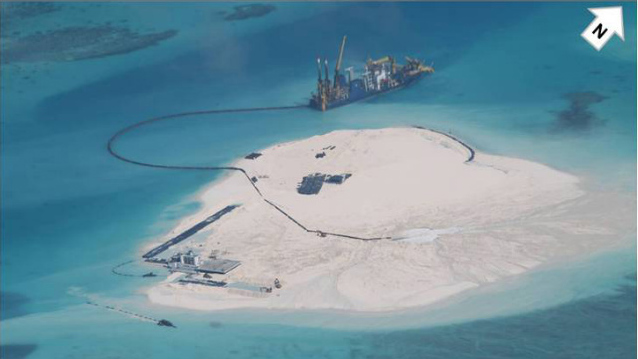The Philippines asserts its new proposal to resolve South China Sea disputes after China said it 'can build what it wants' in the disputed waters

'MORATORIUM' SOUGHT. The
Saying its proposal can also help
The Philippines
said at least 3 countries in the Association of Southeast Asian Nations (ASEAN)
– Vietnam, Indonesia, and Brunei – support the TAP that
the Philippines is set to propose at the ASEAN Ministerial Meeting (AMM) in
Myanmar this week.
“We will continue
to raise our TAP proposal at the coming AMM and related meetings in Myanmar in
order to manage tensions in the area for the sake of regional peace and
stability,” Philippine Department of Foreign Affairs (DFA) spokesman Charles
Jose said Tuesday evening, August 5.
“We believe that
our framework proposal is positive, constructive, and comprehensive, and will
be beneficial to everyone in the region, including China
'Up to China
The DFA was
responding to China 's
statement “that it can build what it wants in the South
China Sea ."
Reuters attributed this statement on
Monday, August 4, to a senior Chinese official.
“The Spratly Islands
are China 's intrinsic
territory, and what China
Yi also made an
apparent reference to the Philippines ,
which China earlier slammed for planning
to build an airport in the South China Sea
even as the Southeast Asian country called for a moratorium
on provocative activities.
Yi said: “Why is
it that when other countries wantonly build airports, nobody says a word? But China
'Moratorium
on specific activities'
The Philippines ' TAP, which it formally introduced
to the public on August 1, aims to curb activities
that raise tension in the South China Sea .
It also serves as
a “more concrete definition” of the ASEAN-China Declaration of Conduct (DOC) of
Parties in the South China Sea, a 2002 statement to maintain peace
in the disputed waters.
The DFA explained
that the TAP is composed of an immediate, an intermediate, and a final approach
to resolve South China Sea disputes.
The immediate
approach is to call for “a moratorium on specific activities that escalate
tension in the South China Sea .”
The intermediate
approach is to highlight “the need and call for the full and effective
implementation of the DOC and the expeditious conclusion of the Code of
Conduct,” a binding document to replace the DOC.
The final
approach is to underscore “the need for a settlement mechanism to bring the
disputes to a final and enduring resolution anchored on international law” – a
move that the Philippines
took when it filed a historic case against China
The DFA said
Friday: “The Philippines
hopes that the claimant states, other ASEAN countries, and the ASEAN dialogue
partners will favorably consider this proposal as it is comprehensive,
constructive, and brings together various initiatives that the Philippines and other countries have been
advocating on the issue of the South China Sea
for the past years.”
http://www.rappler.com/nation/65415-philippines-triple-action-plan-china

No comments:
Post a Comment
Note: Only a member of this blog may post a comment.